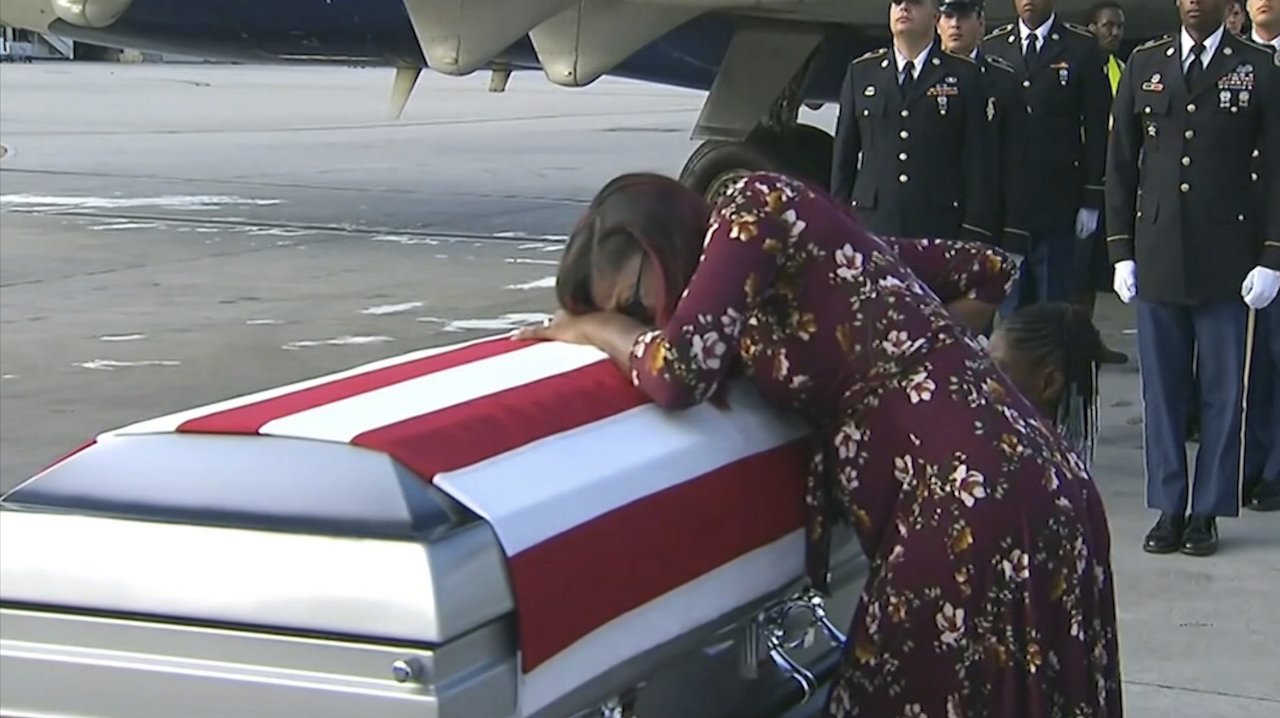Monday
A number of tragedies are being overlooked in the quarrel between Donald Trump and the friends and family of slain Green Beret Sgt. La David Johnson. First, we should focus on those who are grieving, not anyone else. Then we should turn our attention to how Sgt. Johnson and the others got killed and why his body was initially left behind.
It will take time to figure out what happened in Niger. Trump can take immediate lessons from John Irving’s A Prayer for Owen Meany, however, on comforting grieving families.
Rule #1: it’s never about you, only about the mourners. During the Iraq War, one grieving sister said that George Bush “listened while I screamed at him & then held me as I sobbed, you fat f***ing liar.” Bush understood that his first responsibility was to the family and friends, not to his ego.
In the recent case, however, we saw first Trump and then chief of staff John Kelly drag Congresswoman Frederica Wilson through the mud while implicitly criticizing the Johnsons for letting her listen in on Trump’s phone call. Under normal circumstances, I agree that Wilson should have stayed quiet about the interaction, but I am willing to grant her some slack because she, as a mentor to Sgt. Johnson and a family friend, was thrashing around in her own grief. She was appalled by how Trump’s insensitivity hurt Mrs. Johnson and told the world.
Owen Meany’s military job is comforting the families of soldiers killed in Vietnam. Once, when he is delivering a body on an airport tarmac, he encounters a family that is tearing itself apart in its grief. I quote from the novel at length so that you will see how emotionally volatile such situations can be. The “boy” is a teenager with weapons who is playing at being a soldier. Owen speaks in a high-pitched voice because of a damaged larynx:
“Don’t you speak to your sister that way,” the man said.
The boy, not moving, said: “Fuck you—she’s not my sister, she’s just my half sister!”
The mother said: “Don’t speak to your father that way.”
“He’s not my father—you asshole,” the boy said.
“Don’t you call your mother an ‘asshole’!” the man said; but when he stepped closer to the boy on the tarmac—as if he were positioning himself near enough to kick the boy—the boy rose unsteadily to his feet. He held the machete in one hand, the bayonet in the other.
“You’re both assholes,” the boy told the man and woman—and when his half sister commenced to cry again, he once more tipped back his head and spat the tobacco juice; he did not spit on her, but he spat in her general direction.
It was Owen Meany who spoke to him. “I LIKE THAT SHEATH—FOR THE BAYONET,” Owen said. “DID YOU MAKE IT YOURSELF?”
As I had seen it happen before—with strangers—the whole, terrible family was frozen by Owen Meany’s voice. The pregnant girl stopped crying; the father—who was not the tall boy’s father—backed away from Owen, as if he were more afraid of The Voice than of either a bayonet or a machete, or both; the mother nervously patted her sticky hair, as if Owen had caused her to worry about her appearance. The top of Owen Meany’s cap reached only as high as the tall boy’s chest.
The boy said to him: “Who are you? You little twit.”
“This is the casualty assistance officer,” the major said. “This is Lieutenant Meany.”
“I want to hear him say it,” the boy said, not taking his eyes off Owen.
“I’M LIEUTENANT MEANY,” Owen said; he offered to shake hands with the boy. “WHAT’S YOUR NAME?” But in order to shake hands with Owen, the boy would have had to sheathe at least one of his weapons; he appeared unwilling. He also didn’t bother to tell Owen his name.
“What’s the matter with your voice?” he asked Owen.
“NOTHING—WHAT’S THE MATTER WITH YOU?” Owen asked him. “YOU WANT TO DRESS UP AND PLAY SOLDIER—DON’T YOU KNOW HOW TO SPEAK TO AN OFFICER?”
As a natural bully, the boy respected being bullied. “Yes, sir,” he said snidely to Owen.
“PUT THOSE WEAPONS AWAY,” OWEN TOLD HIM. “IS THAT YOUR BROTHER I JUST BROUGHT HOME?” Owen asked him.
“Yes, sir,” the boy said.
“I’M SORRY YOUR BROTHER’S DEAD,” said Owen Meany. “DON’T YOU WANT TO PAY SOME ATTENTION TO HIM?” Owen asked.
“Yes, sir,” the boy said quietly; he looked at a loss about how to PAY SOME ATTENTION to his dead brother, and so he stared forlornly at the corner of the flag that was near enough to the open tailgate of the hearse to be occasionally moved by the wind.
Then Owen Meany circulated through the family, shaking hands, saying he was sorry…
When someone has died, we must PAY SOME ATTENTION to him/her and to family and friends. Everything else is a distraction.


